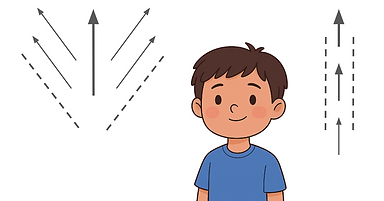%206_PNG.png)
Scotland's Award Winning Neurodivergent Hub - HEAT 25 Forth Valley Winner
The Deep Lens Model
Supporting what matters most to neurodivergent individuals
Developed by Lucinda Wiley, Specialist Health Educator and Mental Health Nurse
All content on this page, including text and original illustrations, is licensed under the Creative Commons Attribution–NonCommercial–NoDerivatives 4.0 International License (CC BY-NC-ND 4.0).
You are welcome to share this work with proper credit for non-commercial purposes.
You may not modify or use it for commercial purposes without permission.
Read the full licence
Ready To Discover More?
Get in touch to access our CPD-accredited seminar
on The Deep Lens Model
What is the Deep Lens Model?
The Deep Lens Model is a practical and compassionate approach that helps adults support neurodivergent individuals by focusing on what they care about most: their special interests.
Instead of trying to shift children away from their passions, this model encourages us to go deeper into them, creating more space for connection, learning and emotional wellbeing.

Why Special Interests Matter
For many neurodivergent individuals, a strong interest in one topic, for example dinosaurs, isn’t just a hobby. It’s a source of comfort, confidence, and joy. These interests help children feel safe, regulated and motivated.
But sometimes, adults worry that these interests are “too narrow” or “obsessive.” They might try to redirect the individuals’s focus toward more “typical” topics. While well-meaning, this approach can often make things harder, not easier.
The Deep Lens Model offers a different path:
Instead of pulling attention away, we follow it... deeply and respectfully.

Key Ideas Behind the Model
1. Special interests are a safe base
They give individuals something to return to when the world feels overwhelming.
2. Deep focus is a strength
Instead of scattering attention, we build on what they already love and understand.
3. Stay inside the passion but stretch it
For example, a love of dinosaurs can open up science, art, history and even social opportunities without leaving dinosaurs behind.
4. Connection grows through interest
Relationships, communication and learning often happen more naturally when we meet the child in their world, not ours.

A Real-World Example
A early-teenage male I worked with had a deep and long-standing interest in dinosaurs. Adults around him were concerned that this interest was limiting his social skills, so they tried to introduce him to other interests like football and modern history.
He became anxious, withdrawn and less engaged.
When we shifted to a Deep Lens approach, everything changed. We explored:
-
The science behind prehistoric habitats and ecosystems
-
The history of fossil discovery in different cultures
-
Creative projects like building dioramas and making digital art
-
Social opportunities, including co-leading a dinosaur workshop for younger children
He became calmer, happier and more confident because he felt seen, supported, and understood.

Why This Works
The Deep Lens Model is based on:
-
Monotropism theory, which explains how autistic minds focus deeply on a few topics rather than spreading attention thinly
-
Research on special interests, which shows these passions support identity, self-esteem and emotional wellbeing
-
Strengths-based, neuroaffirming practice, which moves away from “fixing” the individual and toward honouring who they are

Read More
You can download the full article here:
Download the Deep Lens Model PDF
It includes references, a visual summary of the model, and more details for professionals and caregivers.
Can I Use This?
Yes, this model is shared freely under a Creative Commons license.
You are welcome to read, share, and use it in your work as long as:
You give credit
You do not change the material
You do not use it for commercial purposes
Learn more about the license



